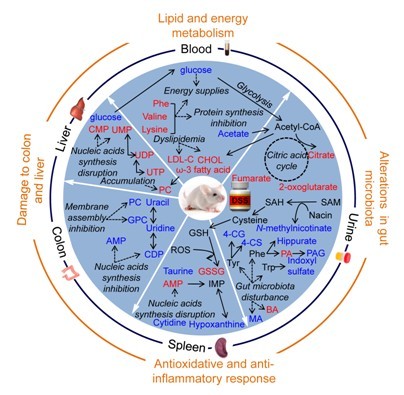WIPM Made Progress in Dextran Sulfate Sodium-Induced Acute Ulcerative Colitis

Two forms of inflammatory bowel disease (IBD), ulcerative colitis (UC) and Crohn¡¯s disease, cause an enormous burden to public health. Although the incidence of IBD is stabilized in high-prevalent areas, such as North America and most developed countries, it is on the rise in areas such as Asia and many developing countries as they are becoming more industrialized. Despite years of investigation, the pathogenesis of IBD is still not identified, but it has been widely accepted that the combination and interaction of genetics, environmental influences, and immunologic abnormalities contributes to the occurrence and perpetuation of this disease. Despite the vast studies of gene mutation and environmental factors, clarity is still needed on the downstream regulatory mechanisms, such as alterations of metabolism associated with IBD.
Prof. Yulan Wang¡¯s group induced acute ulcerative colitis in mice by providing water containing 3% DSS for 7 days and investigated the metabolic changes of plasma, urine and a range of biological tissues by employing a 1H nuclear magnetic resonance (NMR)-based metabonomics approach with complementary information on serum clinical chemistry and histopathology. It was found that DSS-induced acute colitis causes a disturbance of lipid and energy metabolism, damage to the colon and liver, a promoted anti-oxidative and anti-inflammatory response, and perturbed gut microbiotal communities. The information obtained here provided details of the time-dependent and holistic metabolic changes in the development of the DSS-induced acute ulcerative colitis, which could be useful in discovery of novel therapeutic targets for management of IBD. The result has been published online in Journal of Proteome Research (http://pubs.acs.org/doi/abs/10.1021/pr4002383).
This work is funded by the Ministry of Science and Technology of China, the National Nature Science Foundation of China and Chinese Academy of Sciences.